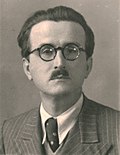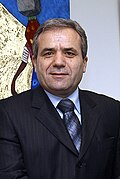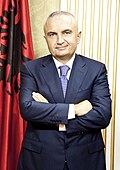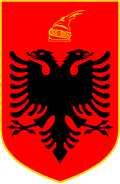| Speakers of the Assembly |
| No. | Portrait | Name | Term in office | Leg. |
|---|
| 1st |  | Xhemal Naipi
(1887–1955)
 | 29 March 1920 | 27 May 1920 | I |
|---|
| 1 month and 28 days |
| 2nd |  | Dhimitër Kacimbra
(1875–1950)
 | 25 September 1920 | 15 November 1920 | I |
|---|
| 1 month and 21 days |
| 3rd |  | Pandeli Evangjeli
(1859–1949)
 | 9 May 1921 | 16 July 1921 | II |
|---|
| 2 months and 7 days |
| 4th |  | Eshref Frashëri
(1874–1938)
 | 16 July 1921 | 30 September 1923 | II |
|---|
| 2 months and 14 days |
| — |  | Eshref Frashëri
(1874–1938)
 | 21 January 1924 | 17 April 1924 | III |
|---|
| 2 months and 27 days |
| 5th |  | Petro Poga
(1850–1944)
 | 17 April 1924 | 2 March 1925 | III |
|---|
| 9 months |
| — |  | Eshref Frashëri
(1874–1938)
 | 2 March 1925 | 24 September 1925 | III, IV |
|---|
| 6 months and 22 days |
| — |  | Pandeli Evangjeli
(1859–1949)
 | 24 September 1925 | 15 September 1926 | IV |
|---|
| 11 months and 22 days |
| 6th |  | Kostaq Kotta
(1889–1949)
 | 15 September 1926 | 7 June 1928 | IV |
|---|
| 1 year, 8 months and 23 days |
| — |  | Pandeli Evangjeli
(1859–1949)
 | 25 August 1928 | 5 March 1930 | V |
|---|
| 1 year, 6 months and 8 days |
| — |  | Kostaq Kotta
(1889–1949)
 | 20 October 1930 | 10 February 1937 | V, VI |
|---|
| 6 years, 3 months and 21 days |
| — |  | Pandeli Evangjeli
(1859–1949)
 | 11 February 1937 | 12 April 1939 | VII |
|---|
| 2 years, 2 months and 1 day |
| 7th |  | Terenc Toçi
(1880–1945)
 | 9 April 1940 | 23 November 1942 | VIII, IX |
|---|
| 2 years, 7 months and 14 days |
| 8th |  | Ernest Koliqi
(1903–1975)
 | 23 November 1942 | 16 May 1943 | IX |
|---|
| 5 months and 23 days |
| 9th |  | Fejzi Alizoti
(1874–1938)
 | 16 May 1943 | 4 August 1943 | IX |
|---|
| 2 months and 19 days |
| 10th |  | Lef Nosi
(1877–1946)
 | 18 October 1943 | 25 October 1943 | X |
|---|
| 7 days |
| 11th |  | Idhomen Kosturi
(1874–1938)
 | 26 October 1943 | 5 November 1943 | X |
|---|
| 10 days |
| 12th |  | Mihal Zallari
(1894–1976)
 | 9 November 1943 | 14 September 1944 | X |
|---|
| 10 months and 5 days |
| 13th |  | Tuk Jakova
(1914–1959)
 | 10 January 1946 | 20 March 1946 | XI |
|---|
| 2 months and 10 days |
| 14th |  | Ymer Dishnica
(1912–1998)
 | 25 March 1946 | 12 July 1947 | XI |
|---|
| 1 year, 3 months and 17 days |
| 15th |  | Manush Myftiu
(1919–1997)
 | 12 July 1947 | 28 June 1950 | XI |
|---|
| 2 years, 11 months and 16 days |
| 16th |  | Teodor Heba
(1914–2001)
 | 28 June 1950 | 6 June 1951 | XII |
|---|
| 11 months and 9 days |
| 17th |  | Mihal Prifti
(1918–1986)
 | 6 June 1951 | 19 July 1954 | XII |
|---|
| 3 years, 1 month and 13 days |
| 18th |  | Gogo Nushi
(1913–1970)
 | 19 July 1954 | 14 November 1956 | XIII |
|---|
| 2 years, 3 months and 26 days |
| 19th |  | Rita Marko
(1920–2018)
 | 14 November 1956 | 21 June 1958 | XIII |
|---|
| 1 year, 7 months and 7 days |
| 20th |  | Medar Shtylla
(1907–1963)
 | 21 June 1958 | 20 December 1963 | XIV, XV |
|---|
| 5 years, 5 months and 29 days |
| 21st |  | Lefter Goga
(1921–1997)
 | 20 November 1964 | 10 September 1966 | XV |
|---|
| 1 year, 9 months and 21 days |
| 22nd |  | Abdyl Këllezi
(1919–1977)
 | 10 September 1966 | 13 January 1969 | XVI |
|---|
| 2 years, 4 months and 3 days |
| 23rd |  | Behar Shtylla
(1918–1994)
 | 13 January 1969 | 20 November 1970 | XVI |
|---|
| 1 year, 10 months and 7 days |
| 24th |  | Fadil Paçrami
(1922–2008)
 | 20 November 1970 | 25 September 1973 | XVII |
|---|
| 2 years, 10 months and 5 days |
| 25th |  | Iliaz Reka
(1924–1975)
 | 25 September 1973 | 27 December 1975 | XVII, XVIII |
|---|
| 2 years, 3 months and 2 days |
| 26th |  | Ali Manaj
(born 1937)
 | 11 February 1976 | 25 December 1978 | XVIII |
|---|
| 2 years, 10 months and 14 days |
| 27th |  | Simon Stefani
(1929–2000)
 | 25 December 1978 | 22 November 1981 | XIX |
|---|
| 2 years, 10 months and 28 days |
| 28th |  | Pali Miska
(1931–2008)
 | 22 November 1981 | 19 February 1987 | XIX, XX |
|---|
| 5 years, 2 months and 28 days |
| 29th |  | Petro Dode
(born 1924)
 | 19 February 1987 | 17 April 1990 | XXI |
|---|
| 3 years, 1 month and 29 days |
| 30th |  | Kastriot Islami
(born 1952)
 | 18 April 1990 | 6 April 1992 | XXI, XXII |
|---|
| 1 year, 11 months and 19 days |
| 31st |  | Pjetër Arbnori
(1936–2006)
 | 6 April 1992 | 24 July 1997 | XXIII, XXIV |
|---|
| 5 years, 3 months and 18 days |
| 32nd |  | Skënder Gjinushi
(born 1949)
 | 24 July 1997 | 4 September 2001 | XXV |
|---|
| 4 years, 1 month and 11 days |
| 33rd |  | Namik Dokle
(born 1946)
 | 4 September 2001 | 30 April 2002 | XXVI |
|---|
| 7 months and 26 days |
| 34th |  | Servet Pëllumbi
(born 1936)
 | 30 April 2002 | 3 September 2005 | XXVI |
|---|
| 3 years, 4 months and 4 days |
| 35th |  | Jozefina Topalli
(born 1963)
 | 3 September 2005 | 10 September 2013 | XXVII, XXVIII |
|---|
| 8 years and 7 days |
| 36th |  | Ilir Meta
(born 1969)
 | 10 September 2013 | 24 July 2017 | XXIX |
|---|
| 3 years, 10 months and 14 days |
| 37th |  | Gramoz Ruçi
(born 1951)
 | 9 September 2017 | 10 September 2021 | XXX |
|---|
| 4 years and 1 day |
| 38th |  | Lindita Nikolla
(born 1965)
 | 10 September 2021 | 26 July 2024 | XXXI |
|---|
| 2 years, 10 months and 16 days |
| 39th |  | Elisa Spiropali
(born 1983)
 | 30 July 2024 | 12 September 2025 | XXXI |
|---|
| 1 year, 1 month and 13 days |
| 40th |  | Niko Peleshi
(born 1970)
 | 12 September 2025 | Incumbent | XXXII |
|---|
| 2 months and 26 days |



























